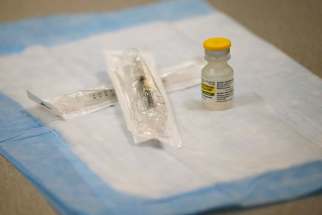Hesitancy over COVID-19 vaccine tough to fathom
Read this article for free:
or
Already have an account? Log in here »
To continue reading, please subscribe:
Monthly Digital Subscription
$0 for the first 4 weeks*
- Enjoy unlimited reading on winnipegfreepress.com
- Read the E-Edition, our digital replica newspaper
- Access News Break, our award-winning app
- Play interactive puzzles
*No charge for 4 weeks then price increases to the regular rate of $19.00 plus GST every four weeks. Offer available to new and qualified returning subscribers only. Cancel any time.
Monthly Digital Subscription
$4.75/week*
- Enjoy unlimited reading on winnipegfreepress.com
- Read the E-Edition, our digital replica newspaper
- Access News Break, our award-winning app
- Play interactive puzzles
*Billed as $19 plus GST every four weeks. Cancel any time.
To continue reading, please subscribe:
Add Free Press access to your Brandon Sun subscription for only an additional
$1 for the first 4 weeks*
*Your next subscription payment will increase by $1.00 and you will be charged $16.99 plus GST for four weeks. After four weeks, your payment will increase to $23.99 plus GST every four weeks.
Read unlimited articles for free today:
or
Already have an account? Log in here »
Hey there, time traveller!
This article was published 29/07/2021 (1591 days ago), so information in it may no longer be current.
Vaccines are one of the most remarkable achievements in medicine. They have prevented widespread illness and death throughout the world. According to the Public Health Agency of Canada, vaccines have saved more lives in Canada in the past 50 years than any other health intervention.
In rich countries like Canada, routine vaccinations for children have eradicated, or nearly eliminated, infectious diseases such as polio, measles, rubella and mumps. Take-up rates in Canada for vaccinations in adolescence are exceptionally high: over 90 per cent in many cases. Most of us never give the science behind vaccines a second thought.
So why so much hesitancy around the COVID-19 vaccine?
The results for COVID-19 vaccines in Canada and around the world have been extraordinary: they’re highly effective (including against the more contagious Delta variant) and the risks of side effects are in line with other vaccines.
Medically, it’s no different than the others. Both the viral vector (AstraZeneca) and mRNA (Pfizer and Moderna) vaccines have gone through the same rigorous clinical trials and regulatory approval as other vaccines. The only difference is the expedited administrative process that was used for COVID-19 vaccines. Health Canada evaluated clinical trial results on a rolling basis under what’s called an interim order, available for large-scale public health emergencies. Normally, Health Canada waits for the completion of all phases of a clinical trial and evaluates them together.
Like all approved products, the agency continues to monitor real-world data from the vaccines. The results for COVID-19 vaccines in Canada and around the world have been extraordinary: they’re highly effective (including against the more contagious Delta variant) and the risks of side effects are in line with other vaccines.
So why are so many Canadians, including in Manitoba, still not vaccinated against COVID-19, given the urgency around preventing a fourth wave?
Most of the hesitancy is age-based. Vaccine take-up among older Manitobans is exceptionally high: 92 per cent of Manitobans over 70 are fully immunized. However, it falls from there. Only 72 per cent of people in their 50s are fully vaccinated and 67 per cent of those in their 40s have both shots.
It declines further to 55 and 59 per cent respectively for those in their 20s and 30s.
Overall, 59 per cent of Manitobans have been fully vaccinated (those under 12 are still not eligible), which is nowhere near enough to reach herd immunity.
It’s unclear why hesitancy is higher among younger age groups.
It’s unclear why hesitancy is higher among younger age groups. It’s not as if people haven’t had enough time to get fully vaccinated. Everyone over 12 has been eligible for the vaccine since May 14. Theories range from younger people mistakenly believing they’re not at risk of becoming severely ill to “just not getting around to it yet.”
Hesitancy based on geography is more complex. It likely involves distrust of government. The Southern Health region continues to lag behind the rest of the province in vaccination rates, including in communities such as the Rural Municipality of Stanley and Winkler.
For some reason, vaccine science accepted by Canadians to eradicate diseases such as polio, rubella, the measles and mumps is largely rejected in those communities for COVID-19.
Part of the reason is misinformation, much of which is disseminated through social media. It’s forced public health officials to regularly dispel unfounded rumours and wild speculation about how COVID-19 vaccines supposedly harm people, such as altering their DNA. We don’t see that level of misinformation around the dozens of other vaccines Canadians regularly receive.
Infectious diseases were the leading cause of death in Canada in the 1900s. They’re now responsible for under five per cent of deaths, owing in large part to routine immunizations. Vaccines are the most studied and scrutinized medical interventions in public health. They’ve existed for more than 200 years. Yet for some reason, there’s a level of mistrust around the COVID-19 vaccine that is absent for others.
We don’t see that level of misinformation around the dozens of other vaccines Canadians regularly receive.
There is nothing “experimental” or new about the COVID-19 vaccine, including the mRNA technology used in many of the products. Vaccines will eventually end the pandemic. It’s just a question of how long it will take for some to get on board with the science.
tom.brodbeck@freepress.mb.ca

Tom has been covering Manitoba politics since the early 1990s and joined the Winnipeg Free Press news team in 2019.
Our newsroom depends on a growing audience of readers to power our journalism. If you are not a paid reader, please consider becoming a subscriber.
Our newsroom depends on its audience of readers to power our journalism. Thank you for your support.









